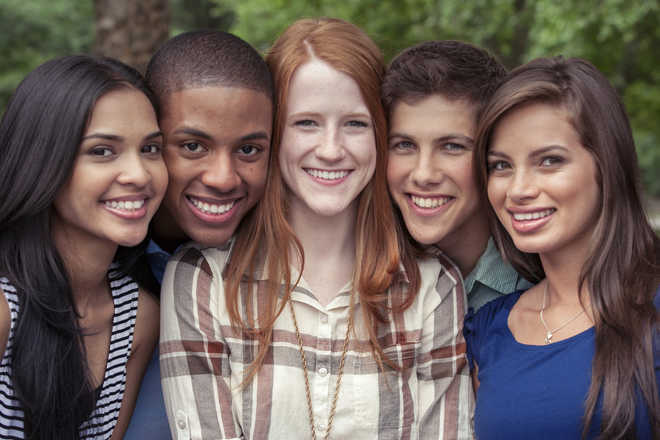New York, June 20
People are more likely to perceive familiar faces to be happier than those of strangers, even when both express the same emotions, a study suggests.
Familiarity–just having ‘expertise’ with someone else’s face through repeated exposure–affects the happiness you perceive in subsequent facial expressions from that person, researchers said.
“Familiarity not only influences traditional ratings of liking, attractiveness, but also impacts ‘deeper’ perceptions of the actual emotion you can extract from that person,” said Evan Carr of Columbia Business School in the US.
Researchers, including those from University of California, San Diego in the US, morphed images of male and female faces to create faces that varied in the type and degree of emotion expressed.
This process resulted in a continuum of morphed faces that ranged from 50 per cent angry to neutral to 50 per cent happy. The team divided the images into two sets. A total of 50 undergraduate student participants came to the lab for a “memory task”.
Each participant saw a series of images–the neutral expressions from one of the two image sets–and was tasked with tracking the colour and number of squares that appeared randomly on some images.
Participants then viewed a series of face pairs in a perceptual task, where they had to indicate whether the happier face was above or below the line shown on screen.
Each pair included a familiar and an unfamiliar face and the faces showed the same objective level of emotion.
Researchers found that participants were more likely to identify the familiar face as the happier one in the pair, despite the fact that the faces showed the same emotion to the same degree.
They were also more likely to identify the familiar face as happier when the faces were 50 per cent happy than when they were 25 per cent happy, researchers said.
In a second experiment, the team asked 40 undergraduate participants to look at a series of faces and decide whether each face was either “happy or angry”.
Researchers found that the results replicated those of the first experiment, participants were more likely to identify familiar faces as happy compared with unfamiliar ones, but only when the faces were emotionally neutral or positive.
Their estimates of how happy the faces were increased as the positive features increased.
The data indicated that familiarity actually shifted how participants perceived the emotional content of the faces–that is, a familiar face needed to have fewer objectively happy features for it to be classified as happy compared with an unfamiliar face.
The study was published in the journal Psychological Science.
Breaking News
 Driving Naari Programme launched in Chandigarh
Driving Naari Programme launched in Chandigarh Punjab farmers reaping benefits of Mann Government’s crop diversification initiatives
Punjab farmers reaping benefits of Mann Government’s crop diversification initiatives Punjab and Kerala Join Hands to Address NRI Concerns
Punjab and Kerala Join Hands to Address NRI Concerns Macron refuses French Prime Minister’s resignation after chaotic election results
Macron refuses French Prime Minister’s resignation after chaotic election results Modi lands in Russia for first visit since Ukraine offensive
Modi lands in Russia for first visit since Ukraine offensive Saudi Arabia approves granting citizenship to global experts under Vision 2030
Saudi Arabia approves granting citizenship to global experts under Vision 2030 Vigilance arrests Panchayat Secretary, former Sarpanch for embezzlement in Panchayat funds
Vigilance arrests Panchayat Secretary, former Sarpanch for embezzlement in Panchayat funds Housing crisis in Canada forcing residents to move out of pricier cities: Poll
Housing crisis in Canada forcing residents to move out of pricier cities: Poll Historic Milestone: Canada Appoints Its First Female Chief of Defense
Historic Milestone: Canada Appoints Its First Female Chief of Defense Victory parade of T20 World Cup-winning Indian cricket team concludes in Mumbai
Victory parade of T20 World Cup-winning Indian cricket team concludes in Mumbai Maximizing impact of Aadhar in Punjab
Maximizing impact of Aadhar in Punjab Amritpal Singh to take oath as Khadoor Sahib MP on July 5
Amritpal Singh to take oath as Khadoor Sahib MP on July 5




































